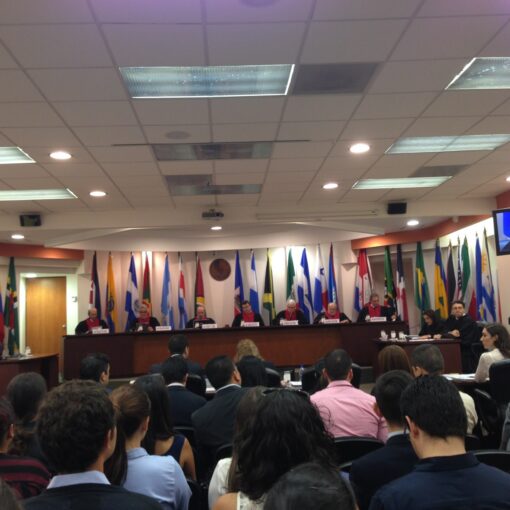
There are many shows taking place in Copenhagen right now. Where the real action is, however, is another question entirely.
Over the weekend a mass demonstration — estimates of the number of participants range from 30,000 to 100,000 — took over parts of the city, leading to nearly 1,000 arrests. When I arrived at the Bella Center first thing this morning (Monday), things were more peaceful but still quite raucous. Tens of thousands of people converged on a very narrow gate so their credentials could be checked. Everyone had to pass through a gauntlet of demonstrators of remarkable variety — militant vegetarians, nuclear proponents, people equating cap-and-trade with genocide, representatives of small island states, people dressed as polar bears and penguins (both to be expected), chickens (a little more surprising) and one as a dog (that meaning eludes me). Those who were accredited to various organizations but did not yet have passes were consigned to wait outside in huge, only loosely-organized lines in a freezing and sometimes snowy weather. Many had to stand outside six hours or more to get it, and even more did not get in at all. That left many panels inside the conference center underpopulated with both speakers and attendees.
Inside the conference center, the heat was on, in more ways than one. Much of the most visible activism last week and this has been from less developed countries that say they are bearing the brunt of climate change but share in none of the blame. Last week the small island nation of Tuvalu led to two suspensions of the plenary session with its demands for greater emissions reductions from the large emitting countries. Today the G77 countries (less developed, mostly African countries) walked out for several hours, again disrupting the plenary session, largely in protest of what they saw as insufficient commitments from the large emitting countries to reduce their emissions. The G77 countries advocate reforms of the Kyoto Protocol plus a new parallel agreement to address additional issues; many of the larger countries call for scrapping the Kyoto Protocol and adoption of a new framework altogether.
More than 100 heads of state, including President Obama, are coming here on Friday. There is widespread thought that many backroom discussions are taking place so that agreements can be in place by Friday and the leaders will be able to make speeches and declare victory. These private discussions will play perhaps the central role in determining the outcome of the conference, and all await word on their contents and conclusions.



